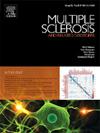影响慢性神经障碍患者在门诊吞咽障碍患者口咽吞咽困难的因素
IF 2.9
3区 医学
Q2 CLINICAL NEUROLOGY
引用次数: 0
摘要
本研究旨在评估不同神经系统疾病患者的神经源性吞咽困难。方法对患有多发性硬化症(MS)、中风或帕金森病(PD)的成人吞咽困难患者进行前瞻性横断面研究。评估包括饮食状态的功能性口服摄入量表(FOIS),吞咽功能的柔性内镜吞咽评估(FEES)与渗透-吸入量表(PAS),以及进食评估工具(EAT-10)和吞咽生活质量问卷(sval - qol)分别用于吞咽困难严重程度和吞咽/进食相关生活质量(SRQoL)。统计分析包括方差分析。结果该研究包括105名MS、卒中和PD组的参与者。与卒中组相比,MS组和PD组的SWAL-QOL评分显著高于卒中组(p = 0.001)。卒中患者有最严重的整体吞咽困难,而MS患者有最高的误吸率(37%)。MS组和PD组患者的疲劳水平显著高于PD组(p = 0.001),卒中组患者的社会功能评分最低(p = 0.041)。在饮食欲望、饮食恐惧、睡眠质量、沟通或EAT-10评分方面,各组之间没有显著差异。结论本研究强调了神经源性吞咽困难对吞咽功能和SRQoL的不同影响。虽然吞咽困难在中风等急性神经系统疾病中是一个众所周知的问题,但患有多发性硬化症等进行性诊断的个体应该在早期阶段转到吞咽诊所,记住它会导致严重的后果,影响他们的生活质量。本文章由计算机程序翻译,如有差异,请以英文原文为准。
Factors influencing oropharyngeal dysphagia in individuals with chronic neurological disorders presenting to the outpatient swallowing disorder clinic
Background
This study aims to evaluate neurogenic dysphagia in individuals with various neurological disorders.
Method
A prospective cross-sectional study was conducted adults with Multiple Sclerosis (MS), stroke, or Parkinson's Disease (PD) who presented with dysphagia. Assessments included the Functional Oral Intake Scale (FOIS) for dietary status, the Flexible Endoscopic Evaluation of Swallowing (FEES) with Penetration-Aspiration Scale (PAS) for swallowing function, and the Eating Assessment Tool (EAT-10) and Swallow Quality of Life Questionnaire (SWAL-QOL) for dysphagia severity and swallowing/eating-related quality of life (SRQoL), respectively. Statistical analyses included ANOVA.
Results
The study included 105 participants with MS, stroke, and PD groups. SWAL-QOL scores were significantly higher in the MS and PD groups compared to the stroke group (p = 0.001). Stroke patients had the most severe overall swallowing difficulties, while MS patients experienced the highest rate of aspiration (37 %). Fatigue levels were significantly higher in the MS and PD groups (p = 0.001), and social function scores were lowest in the stroke group (p = 0.041). No significant differences were observed in eating desire, fear of eating, sleep quality, communication, or EAT-10 scores across the groups.
Conclusion
This study highlights the differential impact of neurogenic dysphagia on swallowing function and SRQoL. Although dysphagia is a known issue in acute neurological conditions such as strokes, individuals with progressive diagnoses such as MS should be referred to swallowing clinics at an early stage, keeping in mind that it can lead to serious consequences that can affect their quality of life.
求助全文
通过发布文献求助,成功后即可免费获取论文全文。
去求助
来源期刊

Multiple sclerosis and related disorders
CLINICAL NEUROLOGY-
CiteScore
5.80
自引率
20.00%
发文量
814
审稿时长
66 days
期刊介绍:
Multiple Sclerosis is an area of ever expanding research and escalating publications. Multiple Sclerosis and Related Disorders is a wide ranging international journal supported by key researchers from all neuroscience domains that focus on MS and associated disease of the central nervous system. The primary aim of this new journal is the rapid publication of high quality original research in the field. Important secondary aims will be timely updates and editorials on important scientific and clinical care advances, controversies in the field, and invited opinion articles from current thought leaders on topical issues. One section of the journal will focus on teaching, written to enhance the practice of community and academic neurologists involved in the care of MS patients. Summaries of key articles written for a lay audience will be provided as an on-line resource.
A team of four chief editors is supported by leading section editors who will commission and appraise original and review articles concerning: clinical neurology, neuroimaging, neuropathology, neuroepidemiology, therapeutics, genetics / transcriptomics, experimental models, neuroimmunology, biomarkers, neuropsychology, neurorehabilitation, measurement scales, teaching, neuroethics and lay communication.
 求助内容:
求助内容: 应助结果提醒方式:
应助结果提醒方式:


